Ms Birkby said she feared the environment would “bear the brunt” of the operations, which she said could impact the endangered freshwater pearl mussel population present in the Ehen.
“No-one begrudges Sellafield repackaging leaking nuclear wastes from the Magnox silos, but this should not be at the further expense of Cumbria’s rivers and groundwaters,” she said.
She added she believed the EA should have required Sellafield to provide a hydrological impact assessment, but the EA said it did not believe that was needed.
“In this case, we did not require a hydrological risk assessment because we consider that the application will not affect any site of nature conservation, significant landscape or heritage, protected species or habitat,” a EA spokesman said.
The licence granted to Sellafield would allow the company to extract up to 350,400 cubic metres (77,077,224 gallons) of water a year until 2031.
Nuclear Free Local Authorities, which represents about 25 councils who are against civil nuclear power, has also written to the EA to raise concerns about the permit.
“We are concerned that the proposal will involve nearly one million litres of contaminated water being discharged into the River Calder and out into the sea every day for an unknown length of time,” they said.
A EA spokesman said: “When we receive water abstraction license applications we take into consideration all the potential impacts on the environment before determining whether to issue a licence.”
